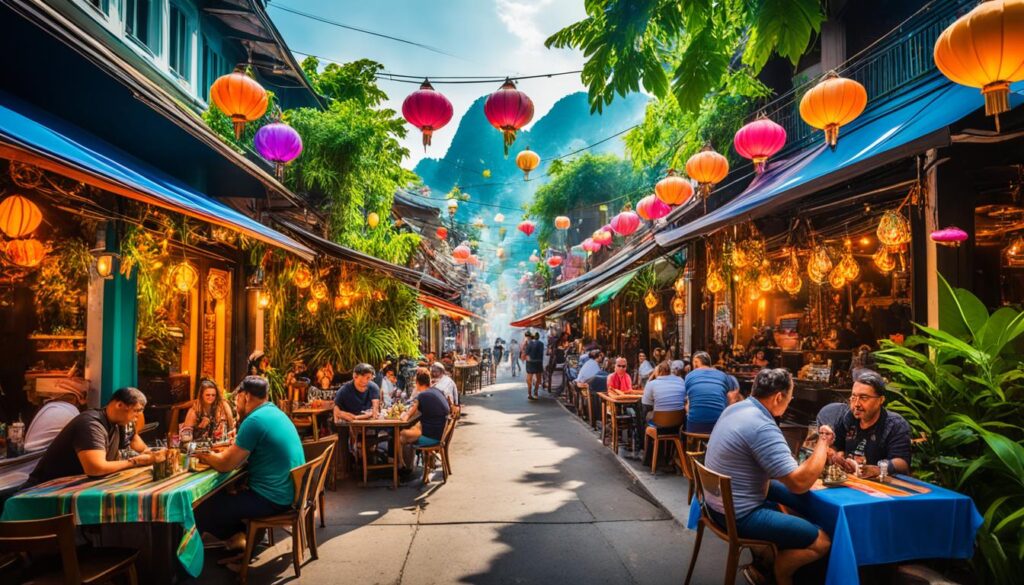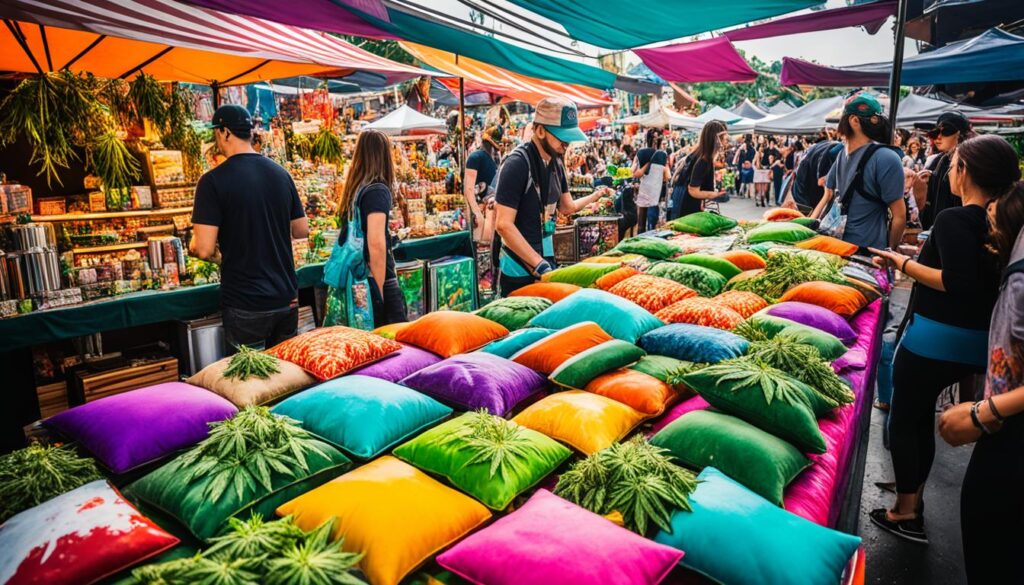Thailand, known for its stunning beaches and vibrant culture, has recently made headlines with its evolving stance on cannabis. In 2022, Thailand became the first country in Asia to decriminalize cannabis for medical purposes. This groundbreaking move aimed to provide relief and alternative treatment options for patients suffering from various medical conditions.
However, the cannabis market in Thailand remains largely unregulated, resulting in concerns over misuse and potential criminal activities. To address these issues, there have been discussions and proposals to reclassify cannabis as a narcotic once again, sparking debates and protests from pro-cannabis advocates.
The changes in cannabis laws in Thailand are driven by the conservative coalition government, which campaigned on banning recreational use and highlighting potential health risks. Especially among young people. This approach has created a division among stakeholders in the cannabis industry. With some expressing concerns about potential negative economic impacts.
Key Takeaways:
- Thailand became the first country in Asia to decriminalize cannabis for medical purposes in 2022.
- The government aims to strictly regulate marijuana use and restrict it to medicinal purposes only.
- The changes in cannabis laws are driven by the conservative coalition government. Which campaigned against recreational use and emphasized health risks.
- Pro-cannabis advocates have protested against proposals to reclassify cannabis as a narcotic.
- The cannabis market in Thailand remains largely unregulated, leading to concerns over misuse and crime.
The Changing Cannabis Laws in Thailand
In recent years, Thailand’s cannabis laws have undergone significant changes, reflecting the evolving attitudes towards marijuana. With the growing understanding of cannabis’s medicinal potential, there has been a shift in perceptions regarding its usage. These changes have influenced the legalization and regulation of weed in Thailand (weed legalization Thailand).
In 2022, Thailand took a major step forward by decriminalizing cannabis for medical purposes. This move was a significant milestone, allowing patients to access cannabis-based medications under strict regulations. However, the cannabis market in the country remained largely unregulated, creating a grey area for recreational use and cultivation (cannabis laws Thailand).
To address this regulatory gap, the Thai government has been actively seeking to establish comprehensive and stringent regulations for marijuana use. One of the proposed changes is the relisting of cannabis as a narcotic substance. Which has sparked controversy and protests from pro-cannabis advocates (cannabis laws Thailand).
The current conservative coalition government, which campaigned on banning recreational cannabis use, advocates for stricter regulations. This commitment to more control over marijuana is led by the government officials who were skeptical of the previous regime’s decision to legalize the drug. Notably, the previous Health Minister. Who played a significant role in the legalization, is now the Deputy Prime Minister and part of the new government coalition (weed legalization Thailand).
These changes in cannabis laws reflect concerns over health risks and substance abuse, especially among young people. The government aims to strike a balance between ensuring access to medical cannabis and preventing misuse. By implementing stricter regulations, the authorities hope to mitigate any potential negative impacts associated with recreational cannabis use (cannabis laws Thailand, weed legalization Thailand).
The Road to Stricter Regulation
The path towards stricter regulation is marked by ongoing debates, considering various factors such as public health, social impact, and economic benefits. Proponents argue that controlled access to medical cannabis can improve patient care and promote research in the field. Critics, on the other hand, raise concerns about potential addiction issues and the need for stringent monitoring (cannabis laws Thailand).
As Thailand continues to refine its cannabis laws, it is crucial to strike a delicate balance that meets the needs of patients while safeguarding public health and preventing misuse. The evolving framework will impact various aspects related to cannabis consumption, cultivation, and distribution, ultimately shaping the landscape of weed in Thailand in the years to come.
| Pros | Cons |
|---|---|
| Enhanced patient access to medical cannabis | Potential for misuse and abuse |
| Promotion of research and development | Increased addiction risks |
| Potential economic benefits | Safety concerns related to quality control |
| Diversification of the healthcare industry | Need for comprehensive regulatory frameworks |
Punishments and Restrictions for Cannabis Use
Before cannabis was decriminalized in Thailand in 2022, possession of the plant could lead to imprisonment for up to 15 years. However, with the changes in cannabis laws, the government is seeking to impose fines and prison sentences for recreational use.
“The proposed draft law suggests fines of up to 60,000 Thai baht (€1,560) for recreational use and prison sentences of up to a year,” explains Dr. Surin Pitsuwan, a legal expert on drug policy in Thailand.
Smoking or vaping cannabis in public places is not allowed and could result in fines. It is important to note that tourists should not transport cannabis across borders, as it is illegal in neighboring countries.
Punishment for Cannabis Use in Thailand
Under the new legal framework, the punishment for cannabis use in Thailand is primarily focused on fines and potential imprisonment. The proposed fines of up to 60,000 Thai baht demonstrate the seriousness with which the Thai government regards recreational cannabis use. While the possibility of imprisonment for up to a year may seem severe to some, it is crucial for individuals to understand and respect the local laws and regulations regarding cannabis in Thailand.
Buying Weed in Bangkok
Although cannabis laws in Thailand have become more relaxed, buying weed in Bangkok is still illegal. Local authorities strictly enforce these laws, and any attempts to purchase cannabis in the city could have severe consequences. Tourists should be aware that they could be targeted by police, who may exploit the rules and extort them for money if caught with cannabis.
Legalization and Tourism
Thailand’s move to decriminalize cannabis has attracted cannabis enthusiasts from around the world. However, it is important to remember that while the laws have changed, there are still restrictions and penalties in place. Tourists must respect the local regulations and avoid engaging in illegal activities related to cannabis during their visit to Thailand.
| Punishments | Restrictions |
|---|---|
| Fines of up to 60,000 Thai baht for recreational use | No smoking or vaping cannabis in public places |
| Prison sentences of up to a year for recreational use | No transportation of cannabis across borders |
Where and How to Consume Cannabis in Thailand
When it comes to consuming cannabis in Thailand, there are specific guidelines and regulations that you need to be aware of. While the laws have become more lenient in recent years, it’s still important to understand the do’s and don’ts to avoid any legal trouble. Here’s what you need to know:
Consumption Guidelines
In Thailand, the legal age for consuming cannabis is set at 20 years old, which aligns with the legal drinking age in the country. Adults over the age of 20 can possess up to 5 ounces (150 grams) of cannabis legally. However, it’s important to note that recreational cannabis is still illegal in Thailand according to the law. Only medicinal cannabis, with no THC restrictions, is legal and requires a prescription.
When it comes to consumption, smoking or vaping cannabis in public areas such as parks, streets, schools, government buildings, and public transportation is strictly prohibited. Violating this rule can lead to a fine of up to 25,000 Baht or imprisonment for up to 3 months. It’s important to respect these regulations to ensure a safe and legal experience.
Where to Find Cannabis
Thailand has a thriving cannabis industry, with over 6,400 approved cannabis dispensaries as of 2023. These dispensaries offer a wide variety of cannabis products, including flowers, edibles, concentrates, and topicals. Popular tourist destinations like Bangkok, Chiang Mai, and Pattaya have seen a boom in cannabis cafes and weed dispensaries, where you can find a range of high-quality products.
It’s important to purchase cannabis from reputable and licensed establishments to ensure product quality and adherence to legal guidelines. Avoid purchasing from unverified sources to prevent any complications or legal issues.
Additional Considerations
While Thailand has relaxed its laws around cannabis, it’s important to keep in mind that there are still restrictions and regulations in place. Tourists visiting Thailand are not allowed to purchase cannabis for recreational use, and offenders may face deportation if caught violating cannabis laws.
When purchasing cannabis, specific documentation is required, including a valid passport for identification purposes and a Temporary Use Authorization for Cannabis (TUAC) permit from the Thai Traditional and Alternative Medicine Department. These documents are crucial for legal purchase and consumption of cannabis in Thailand.
Lastly, it’s worth noting that the rules and regulations surrounding cannabis shops and home-growing are still being clarified and updated. As a consumer, it’s essential to stay informed and updated on any changes to ensure compliance with the law.
| Key Guidelines for Consuming Cannabis in Thailand: | |
|---|---|
| Legal age for consuming cannabis: | 20 years old |
| Legal possession limit: | Up to 5 ounces (150 grams) |
| Where to purchase cannabis: | Reputable and licensed cannabis dispensaries |
| Restricted areas for consumption: | Parks, streets, schools, government buildings, and public transportation |
| Additional documentation required: | Valid passport and Temporary Use Authorization for Cannabis (TUAC) permit |
For more information on cannabis laws in Thailand, you can visit the following sources:
- Wikipedia – Cannabis in Thailand
- Juicy Buds Thailand – Cannabis Laws in
- The Week – Thailand to Reverse Weed

Cannabis Culture and Tourism in Thailand
The decriminalization of cannabis in Thailand has given rise to a vibrant cannabis culture and a growing weed tourism industry. Thailand, known for its beautiful beaches, temples, and rich history, has now become a destination for cannabis enthusiasts from around the world.
With the legalization of marijuana, more than 3,000 inmates held on cannabis charges were released in 2022, marking a significant change in the country’s approach to drug laws. This move has helped pave the way for the development of an industry that is projected to be worth 336 billion baht (€8.7 billion) by 2030, a substantial increase from 28 billion baht (€728 million) in 2022.
Since legalization, over 1.1 million Thai citizens have registered for licenses to grow cannabis, and more than 6,000 weed dispensaries have been established across the country. These dispensaries, especially in popular tourist areas like Bangkok, attract a significant number of foreign visitors.

“An estimated 70%-80% of customers at weed shops in Bangkok are foreigners, primarily from Asian countries like Japan, Malaysia, China, and the Philippines, as well as some from Europe.”
At these cannabis shops, visitors can find a variety of strains, including Thai weed strains, known for their unique flavors and effects. The shops themselves are almost as common as convenience stores in some areas of Bangkok, highlighting the rapid growth of the cannabis industry in Thailand.
Many first-time users, mostly Asians, make up about half of the customers at specific cannabis shops. These customers are often discreet and prefer smoking their purchases indoors to respect local customs and regulations. Asian tourists, particularly those from China and Singapore, are generally cautious about cannabis usage and seek information about drug detection and detox products.
It’s important for tourists to familiarize themselves with Thai laws and regulations surrounding cannabis. Public smoking of cannabis is banned in Thailand, and possession of cannabis without a license before legalization could lead to severe penalties, including up to 15 years in prison.
Additionally, proposed draft laws suggest fines and potential prison sentences for recreational cannabis use, advertising or marketing cannabis, and farming cannabis without a license. These regulations signify the Thai government’s effort to balance the growing cannabis industry with appropriate governance.
For more information on weed tourism in Thailand, visit the following links:
- Is Weed Still Legal in Thailand
- Thailand: A Rising Destination for Weed
- Thailand’s Cannabis Culture and the Rise of Weed
Conclusion
In conclusion, navigating Thai cannabis requires a careful understanding of the evolving laws and regulations surrounding the use of weed in Thailand. The government’s focus on medicinal use highlights concerns over health risks, particularly among young people. While cannabis cafes and dispensaries still exist, there are strict rules in place to restrict its use, such as not smoking or vaping in public places.
Tourists should be aware of the limitations and restrictions when it comes to cannabis in Thailand to avoid any legal consequences. By staying informed and adhering to the guidelines, you can ensure a safe and enjoyable experience while exploring the cannabis culture in Thailand.
As the landscape of weed in Thailand continues to change, it is important to keep up-to-date with the latest regulations to avoid any misunderstandings or penalties. By respecting the laws and using cannabis responsibly, you can navigate Thai cannabis wisely and make the most of your time in this beautiful country.
FAQ
What is the current status of weed in Thailand?
What were the previous cannabis laws in Thailand?
What are the proposed punishments for recreational cannabis use in Thailand?
Where can you consume cannabis in Thailand?
Are there restrictions on smoking cannabis in public places?
Where can you buy weed in Thailand?
What are the concerns regarding the cannabis industry in Thailand?
Is cannabis tourism popular in Thailand?
Are there risks associated with cannabis use in Thailand for tourists?
How is the cannabis culture in Thailand?
What should you keep in mind when navigating Thai cannabis?
Source Links
- https://www.theguardian.com/society/2023/jan/10/consuming-cannabis-in-thailand-what-tourists-need-to-know-marijuana-weed-rules
- https://www.euronews.com/travel/2024/05/16/is-weed-still-legal-in-thailand-heres-what-tourists-need-to-know-as-government-u-turns
- https://www.tourismthailand.org/Articles/10-things-tourists-need-to-know-about-cannabis-in-thailand

As a veteran weed smoker for over 30 years and been very clean for the last 3 years, I have been craving it.
One thing I’ve never done is consume it?
I came across SunJet Plug and thought mmmm how esp with legalities etc.
So I made the plunge and purchased 12 brownies, well within 30 mins it kicked in and it was immense as I had a whole one from the off 😜
The rest did not last a week I was having 2 a day and my wife lost me for a few days I was in my own world apparently.
Kudos to the Sunjet plug love em, the taste is a bit undesirable could do with a tweak or two other than that no complaints
Contact him on his telegram link: t.me/sunjetplug
His email : sunjetplug@gmail.com
Many many thanks.😁
Take note ,he does not have telegram channels
Sunjet plug is 100% legit.. I’m a repeat customer.. I’ve ordered 10+ times now, and I’ve never had an issue.. Great product, great service.
Sunjet plug is extremely trust worthy , they never fail in what ever product I order, and its always in my hands with an hour of ordering 99% of the time….. its honestly rare when its more than 2 hours and that’s only because its the weekend when ive orded or a national holiday is on or something lol …. brilliant service I’m probably pushing maybe 2 months with them and I’ve never been disappointed ❤️ my only recommendation would maybe do a stamp card to get something free after 5 orders or a loyalty bonus of some kind ❤️
Email sunjet.. sunjetplug@gmail.com